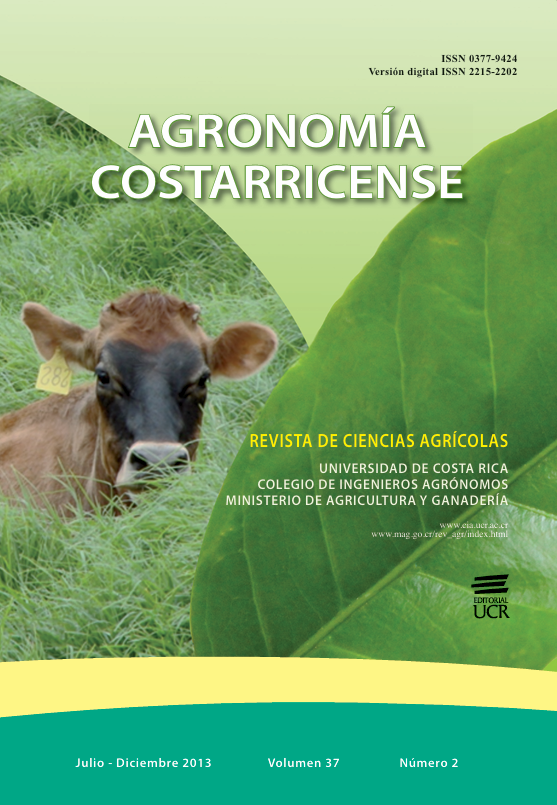Abstract
To adapt technological tools based on global positioning systems to agricultural practices is crucial to improve the efficiency of production per area, increasing the productivity levels. The objective of this project was to develop a methodology, using phenological indicators and precision agriculture, to estimate the production in the banana plantation at EARTH University. Was to generate Maps of the productivity behavior and population density were generated in Block 1. The methodology consisted of several stages: first, the maximum distance of the sampling was determined with a semivariogram, calculated at 125 m; to gather more accurate information, sampling was performed at a distance of 80 m by 50 m; geo-referenced data collection of the population was made in a circular area of 8 m radius, as number of hands per bunch. Finally, the data was interpolated to obtain maps of areas and their production rates. A larger area was found within the optimal range of the number of production units per hectare. In terms of production, 4% (5,28 ha) of the farm area was below the breakeven point - and 94% was above the equilibrium point. Some areas lower their productivity when they exceed the 1800 plants. ha-1. It was possible to develop a methodology to collect data from phenological index of number of hands per bunch and precision agriculture. The tool identified the critical production points but they were not associated with any soil or climatic variable Therefore, it is recommended to perform further analysis of the areas, incorporating other variables in an integrated way.References
BRAGACHINI M., MARTINI A. VON., BIANCHINI A. 2011. Proyecto agricultura de precisión Córdoba (AR): INTA. Consultado 28 febrero 2011. Disponible en http://www.bit.ly/nmdemf
CASTAÑEDA D. 2011. Evaluación de métodos estadísticos para el desarrollo de una propuesta de manejo por sitio específico para banano. Tesis de doctorado, Universidad Nacional de Colombia, Medellín, Colombia. 129 p.
CHARTUNIL E., CARVALHO F., MARÇAL D., RUZ E. 2007. Nuevas herramientas para mejorar la gestión tecnológica en la empresa agropecuaria. Consultado 27 febrero 2011. Disponible en http://webiica.iica.ac.cr/bibliotecas/repiica/B0483e/B0483e.pdf
CORBANA (Corporación Bananera Nacional C.R.). 2011. Importación mundial de banano. Consultado 1 marzo 2011. Disponible en http://www.bit.ly/r9HICB
CUBILLO A.A. 2005. Uso de índices fenológicos en la agricultura de precisión del cultivo de banano. Tesis de licenciatura, Universidad EARTH, Guácimo, Costa Rica. 34 p.
PETITGAS P. 1996. Geostatistics and their applications to fisheries survey data: a history of ideas, 1990-2007, pp. 114-142. In: B A. Megrey y E. Mosknes (eds.). Computers and fisheries research. Londres (GB): Chapman-Hall. Consultado 18 agosto 2011. Disponible en http://www.bit.ly/pmWf7Q
VAQUERO R. 2003. Soil physical properties and banana root growth, pp. 125-131. In: D. Turner y F. Rosales (eds.). Banana root system: toward a better understanding for its productive management. San José de Costa Rica: Proceedings Inibap. Musalac. Corbana.
Comments

This work is licensed under a Creative Commons Attribution-NonCommercial-NoDerivatives 4.0 International License.
Copyright (c) 2016 Agronomía Costarricense


